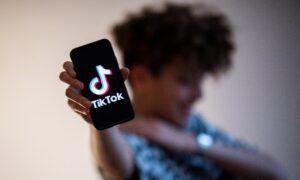The Beijing-owned app is part of the Chinese Communist Party’s cognitive military operations against the U.S.
Health Viewpoints
American legislators are considering a potential ban on TikTok. However, they have indicated a willingness to allow the video app to maintain operations on one condition—if ByteDance, the app’s Chinese parent company, relinquishes ownership.
Nonetheless, an outright ban remains the only sensible option, regardless of who owns ByteDance.
The TikTok Threats
We are talking about an app that is often described as the
digital equivalent of crack cocaine.
TikTok has garnered a reputation for disseminating unsuitable material, leading to its prohibition in multiple nations, including Nepal, India, Bangladesh, Pakistan, and even China, its country of origin.
Notably, the fact that the Chinese Communist Party (CCP) does not allow its own citizens to use TikTok should raise eyebrows. Instead, Chinese citizens use Douyin, a watered-down version of its controversial sibling.
TikTok is problematic in various ways.
Data Collection
While data collection is common among apps, it’s crucial to recognize that TikTok takes this practice to a new level.Prior to its latest update, the application actively gathered data from users’ phone clipboards, even when not in use. This implied that any sensitive information, such as passwords or private conversations copied and pasted by adults or children, was recorded, saved by TikTok, and
possibly shared with the CCP.
In fact, a recent report by
The Wall Street Journal warned that TikTok is likely still sharing U.S. user data with ByteDance employees in Beijing, despite efforts to segregate this data.
Moreover, according to China’s cybersecurity regulations, TikTok and other Chinese-owned applications are obligated to share all user data with the CCP upon request. This data can potentially be weaponized and used against the American people, including children.
Cognitive Warfare
Last year,
The Guardian discussed TikTok’s potential involvement in the CCP’s latest form of warfare: cognitive warfare.
In recent times, TikTok has become a notable component of the CCP’s
cognitive military operations, in which the human mind is the new battleground. Exploiting an app currently used by approximately 150 million Americans, many of whom are young and impressionable children, is a strategic move.
In other words, almost half the U.S. population uses TikTok—a fact unlikely lost on the CCP, a dangerous regime that could potentially leverage the app to influence upcoming elections.
Dangerous Online Challenges
In addition to its extensive data collection, TikTok is known for various unsafe challenges that have emerged on the platform.Take the boat challenges, for example, which have recently become a concerning trend. Uninitiated people partake in audacious acts, leaping or somersaulting off swiftly moving boats with the aim of recording these potentially life-ending endeavors. Regrettably, this specific challenge has resulted in numerous
tragic deaths, as participants have suffered severe injuries such as broken necks and drownings after colliding with the water’s surface.
Another dangerous trend is the “Scarf Game,” also known as the “Blackout Challenge.” Most participants are young kids who deliberately restrict their oxygen intake by using a scarf or belt, leading to temporary loss of consciousness. Unfortunately, this activity has also led to tragic outcomes, including fatalities caused by suffocation.
A third trend, the “Benadryl Challenge,” urges TikTok users to consume excessive amounts of the over-the-counter antihistamine medication. This dangerous challenge can result in serious consequences, such as heart issues, seizures, and even overdose. In the United States, numerous incidents have been documented in which participants sought emergency medical aid because of the harmful effects of this challenge. In April 2023,
a 13-year-old boy in Ohio died after engaging in this TikTok trend.
Amnesty Reports Expose Mental Health Risks
Two Amnesty-sponsored reports—“
Driven Into the Darkness: How TikTok Encourages Self-Harm and Suicidal Ideation” and “
I Feel Exposed: Caught in TikTok’s Surveillance Web”—clearly demonstrate that TikTok’s content recommendation system and intrusive data collection methods pose a grave threat to young users.
This is due to the amplification of depressive and suicidal content, which could potentially exacerbate preexisting mental health issues. Children are being inundated with content that presents a highly distorted perception of the world, beauty standards, and mental well-being.
For millions of Americans, TikTok has become the distorted lens through which they view the world and themselves. In the
words of Lisa Dittmer, a tech researcher at Amnesty, the reports’ findings “expose TikTok’s manipulative and addictive design practices, which are designed to keep users engaged for as long as possible.”
She warned that “the platform’s algorithmic content recommender system, credited with enabling the rapid global rise of the platform, exposes children and young adults with pre-existing mental health challenges to serious risks of harm.”
Considering that TikTok is by far the most popular social media app in the United States and that the mental health of American children continues to decline, an outright ban on TikTok is presented as the only sensible option.
Views expressed in this article are the opinions of the author and do not necessarily reflect the views of The Epoch Times. Epoch Health welcomes professional discussion and friendly debate. To submit an opinion piece, please follow these guidelines and submit through our form here. 






